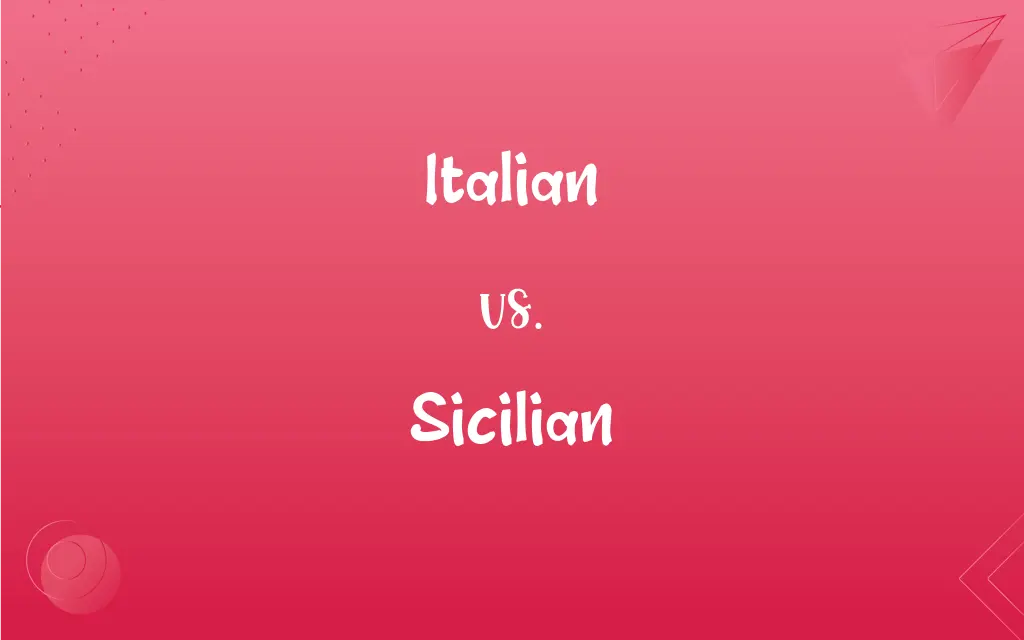Italian vs. Sicilian: What's the Difference?
Edited by Janet White || By Harlon Moss || Updated on June 7, 2024
Italian refers broadly to the culture, language, and people of Italy, while Sicilian pertains specifically to the culture, dialect, and inhabitants of Sicily, an island that is part of Italy.

Key Differences
Italian encompasses a multitude of aspects, ranging from the language spoken by the majority of Italy's population to the rich cultural, historical, and culinary narratives of the country. Sicilian, while nestled within the broader Italian context, offers its distinct cultural, linguistic, and gastronomic nuances, carving out its particular niche within Italy's diverse tapestry. The multifaceted Italian spectrum involves traditions and dialects from various regions, each contributing to the nation's rich mosaic. Sicilian culture and dialect, deeply rooted in a history interwoven with various conquering entities, stand out with their unique influences from Greek, Arabic, and Norman dominations.
The Italian language, recognized as the official language of Italy, is widely spoken and is used as the standard for communication throughout the nation. In contrast, Sicilian is a separate language or dialect primarily spoken in Sicily and in some parts of southern Italy, characterized by its own syntax, vocabulary, and phonetics, presenting a varied linguistic profile compared to standard Italian. Italian is utilized in official documents, national broadcasts, and is the medium of instruction in educational institutions across the country. Meanwhile, Sicilian, though not officially recognized, is crucial in maintaining the rich historical and cultural heritage of Sicily, resonating in local literature, folk songs, and daily communications among natives.
The Italian identity is broad and encompasses the collective histories, practices, and norms of various regions, from the northern Alps to the southern coasts. On the other hand, Sicilian identity, while inherently Italian, holds a distinct place due to Sicily's geographical isolation and its unique historical path, often revealing a stronger localized identity among its inhabitants. While Italian cuisine, with its diverse regional variations, has permeated international culinary scenes, Sicilian cuisine, with its use of specific ingredients like saffron, raisins, and nuts, often reflects its multicultural history and showcases its difference even within the wider Italian culinary scene.
In terms of geographical aspects, the term Italian may refer to anything related to the entirety of the Italian Peninsula and its varied regions. Sicilian, specifically, refers to aspects intrinsic to the island of Sicily, underscoring its particular geography, agricultural products, and the surrounding Mediterranean influences. From a global perspective, Italian culture and language have been widely disseminated and celebrated, contributing significantly to various fields such as art, science, and gastronomy. Sicilian, while perhaps less globally widespread, maintains an unyielding and vivid presence within the academic, cultural, and culinary dialogues, contributing notably to the enriched Italian and global tapestry.
Comparison Chart
Geographical Scope
Pertains to the entire country of Italy
Specifically related to the island of Sicily
ADVERTISEMENT
Language/Dialect
Standard Italian is spoken nationwide
Sicilian is a distinct dialect/language
Cultural Influence
Inclusive of various regional cultures
Distinct culture with various external influences
Global Recognition
Widely recognized and influential globally
Recognized, with a more localized influence
Cuisine
Known for diverse regional culinary variations
Noted for its unique, historically influenced cuisine
Italian and Sicilian Definitions
Italian
Italian refers to anything related to the country of Italy, including its people, culture, or language.
The Italian cuisine is renowned for its delicious pasta and pizza dishes.
ADVERTISEMENT
Sicilian
Sicilian cuisine denotes the culinary traditions and dishes originating from Sicily.
Sicilian pizza, characterized by its thick crust, is quite different from other Italian pizzas.
Italian
When referring to people, Italian denotes the inhabitants of Italy or individuals of Italian descent.
The Italian community celebrated their heritage during the vibrant cultural festival.
Sicilian
In a linguistic context, Sicilian is a Romance language spoken primarily in the Sicily region.
Although she spoke fluent Italian, understanding Sicilian dialect posed a challenge.
Italian
As a language, Italian is a Romance language used officially in Italy and several other nations.
She is fluent in Italian, enabling her to communicate effectively while traveling in Italy.
Sicilian
Sicilian as a noun refers to a person who is from the island of Sicily.
The Sicilian artist brought the vivid colors and history of his homeland into his work.
Italian
In a cultural context, Italian pertains to the rich history, traditions, and social norms of Italy.
The Italian Renaissance was a pivotal period that significantly influenced art and culture globally.
Sicilian
Sicilian pertains to anything related to Sicily, its inhabitants, culture, or dialect.
He enjoyed the rich and distinct flavors of Sicilian cuisine.
Italian
Italian, as an adjective, describes the origin of products, practices, or entities related to Italy.
Italian leather is often associated with premium quality and durability.
Sicilian
In a cultural context, Sicilian refers to the customs, art, and social activities of Sicily.
Sicilian puppetry, a unique form of theatrical performance, is admired by various cultures globally.
Italian
Of or relating to Italy or its people, language, or culture.
Sicilian
Of or relating to Sicily or its people, language, or culture.
Italian
A native or inhabitant of Italy.
Sicilian
A native or inhabitant of Sicily.
FAQs
Are the Italian and Sicilian languages the same?
No, Italian is the standardized language of Italy, while Sicilian is a distinct dialect/language spoken primarily in Sicily.
Can all Italians understand the Sicilian dialect?
Not necessarily, as Sicilian possesses unique vocabulary and phonetics that might be unfamiliar to non-Sicilian Italians.
Which term refers to the broader cultural and linguistic context: Italian or Sicilian?
"Italian" refers to a broader cultural and linguistic context, while "Sicilian" pertains to the specifics of Sicily.
Is Sicily an independent country?
No, Sicily is an autonomous region of Italy.
What does "Italian" broadly refer to?
"Italian" broadly refers to anything related to Italy, including its language, culture, and people.
Can "Italian" refer to a citizen of Italy?
Yes, "Italian" can denote a person from Italy or of Italian descent.
Is Sicilian history part of Italian history?
Yes, Sicilian history, while possessing unique aspects, is intrinsically intertwined with Italian history.
Is Sicilian considered Italian?
Yes, Sicilian pertains specifically to Sicily but is inherently Italian due to Sicily’s status as a region of Italy.
Is Sicilian cuisine different from general Italian cuisine?
Yes, Sicilian cuisine carries unique influences, ingredients, and dishes distinct from other Italian regional cuisines.
Is Sicilian culture significantly different from Italian culture?
Sicilian culture, while part of the larger Italian cultural context, holds unique characteristics shaped by varied historical influences.
Can Sicilian be referred to both a person and a dialect?
Yes, Sicilian can refer to a person from Sicily and the dialect spoken there.
Are there notable variations within Italian and Sicilian cuisines?
Yes, both Italian and Sicilian cuisines showcase notable regional variations in ingredients, dishes, and culinary techniques.
How significant is the Italian language on a global scale?
Italian is notable globally, particularly in fields like culinary arts, fashion, and automotive design.
How widely is Italian spoken globally?
Italian is spoken by millions globally, with significant speaker populations in various countries outside Italy.
What is a renowned Italian culinary contribution?
Pizza, originating from Italy, is one of the country’s most renowned culinary contributions.
Are there Sicilian communities outside of Sicily?
Yes, there are Sicilian communities in various countries, contributing to the global diaspora.
Is the Italian Renaissance recognized worldwide?
Yes, the Italian Renaissance is globally recognized for its profound impact on art, culture, and science.
What influences shaped Sicilian culture and dialect?
Sicilian culture and dialect have been shaped by numerous influences including Greek, Arabic, and Norman.
Can the term "Italian" relate to the language and the nationality?
Yes, "Italian" can refer to the language spoken in Italy and the nationality of its citizens.
Does Sicilian dialect have official status?
No, Sicilian dialect does not have official status but is spoken by millions in and outside Sicily.
About Author
Written by
Harlon MossHarlon is a seasoned quality moderator and accomplished content writer for Difference Wiki. An alumnus of the prestigious University of California, he earned his degree in Computer Science. Leveraging his academic background, Harlon brings a meticulous and informed perspective to his work, ensuring content accuracy and excellence.
Edited by
Janet WhiteJanet White has been an esteemed writer and blogger for Difference Wiki. Holding a Master's degree in Science and Medical Journalism from the prestigious Boston University, she has consistently demonstrated her expertise and passion for her field. When she's not immersed in her work, Janet relishes her time exercising, delving into a good book, and cherishing moments with friends and family.






































































